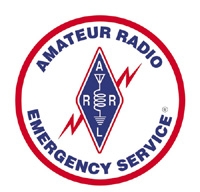ARES
 The Amateur Radio Emergency Service ® (ARES ® ) consists of licensed amateurs who have voluntarily registered their qualifications and equipment for communications duty in the public service and when disaster strikes. Every licensed amateur, regardless of membership in ARRL or any other local or national organization is eligible to apply for membership in ARES. Training may be required or desired to participate fully in ARES. You can read the official ARRL material on ARES here.
The Amateur Radio Emergency Service ® (ARES ® ) consists of licensed amateurs who have voluntarily registered their qualifications and equipment for communications duty in the public service and when disaster strikes. Every licensed amateur, regardless of membership in ARRL or any other local or national organization is eligible to apply for membership in ARES. Training may be required or desired to participate fully in ARES. You can read the official ARRL material on ARES here.
ARES is organized regionally. The regions match the regions used by the Connecticut Department of Emergency Services and Public Protection. In Southwest CT, we are in region 1. There are five “district emergency coordinators”, or DECs that report into the SEC. You can learn much more about ARES in Connecticut here: www.ctares.org.
ARES members can participate in public service events to provide communications support that enhances the safety of the operation. Events like charity bike rides and runs are classic examples where amateur radio provides the organizers with communications that cover a wide area. These events help ARES members practice their skills in deploying their equipment and operating on a “controlled net” to practice effective communications skills.
At this time, we are looking to create relationships with local agencies and organizations to provide assistance during large events and during emergencies. It is important to realize that ARES members don’t “self deploy” during disasters, but are part of an overall emergency preparedness team.
Local Nets
There is a periodic region 1 CERT/ARES net. When called, this net occurs on Tuesday at 8:00 PM. All amateurs are welcome, and encouraged to check into the net. Frequencies for the CERT/ARES net are 146.475 (+ 1 MHz Split) with a PL of 100.0 Hz. At this time GNARC officers are looking into a way to link one of our repeaters into the statewide net that occurs on Sundays.
You can also learn more about CERT, which is a fast growing emergency preparedness organization across the country, see http://www.fema.gov/community-emergency-response-teams. You can also contact local CERT leaders in Wilton, Stamford, Fairfield, Westport and other Region 1 towns. More towns are turning to CERT to help in emergencies, and the addition of amateur radio to the CERT is important to operations.
For more information, please contact Paul Lourd, WB2JVB, DEC Connecticut Region 1.
